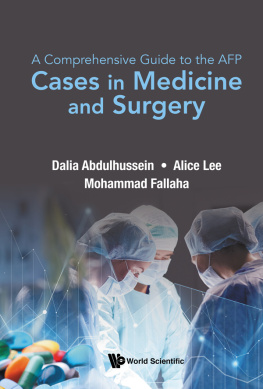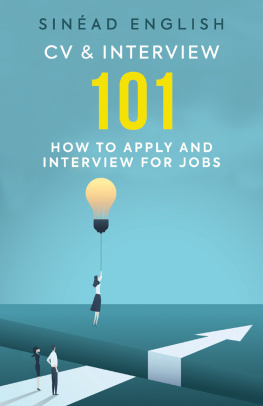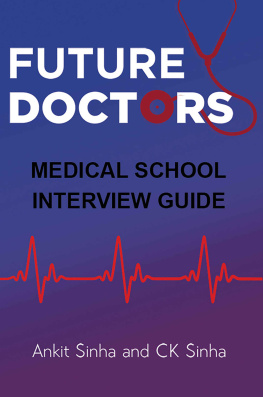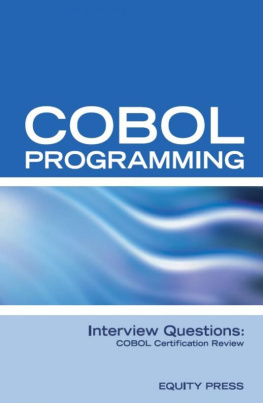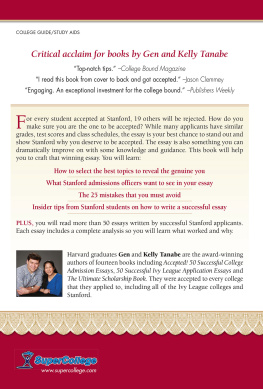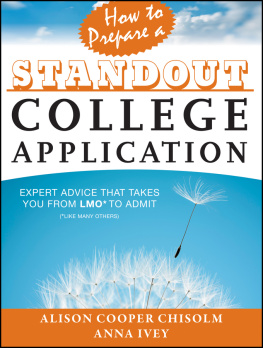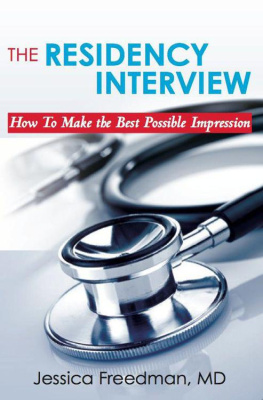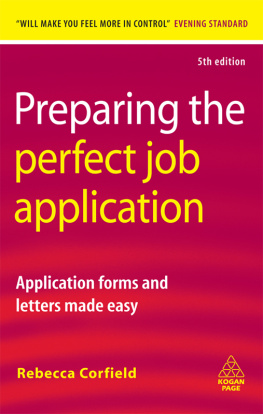Contents


Published by
World Scientific Publishing Co. Pte. Ltd.
5 Toh Tuck Link, Singapore 596224
USA office: 27 Warren Street, Suite 401-402, Hackensack, NJ 07601
UK office: 57 Shelton Street, Covent Garden, London WC2H 9HE
British Library Cataloguing-in-Publication Data
A catalogue record for this book is available from the British Library.
A COMPREHENSIVE GUIDE TO THE AFP
Cases in Medicine and Surgery
Copyright 2021 by World Scientific Publishing Co. Pte. Ltd.
All rights reserved. This book, or parts thereof, may not be reproduced in any form or by any means, electronic or mechanical, including photocopying, recording or any information storage and retrieval system now known or to be invented, without written permission from the publisher.
For photocopying of material in this volume, please pay a copying fee through the Copyright Clearance Center, Inc., 222 Rosewood Drive, Danvers, MA 01923, USA. In this case permission to photocopy is not required from the publisher.
ISBN 978-981-123-180-3 (hardcover)
ISBN 978-981-123-306-7 (paperback)
ISBN 978-981-123-181-0 (ebook for institutions)
ISBN 978-981-123-182-7 (ebook for individuals)
For any available supplementary material, please visit
https://www.worldscientific.com/worldscibooks/10.1142/12149t=suppl
Printed in Singapore
Senior Reviewers
Mr Daniel Leff MBBS BSc FRCS PhD
Consultant in Oncoplastic Breast Surgery and Reader in Breast Surgery at Imperial College London
Mr Sheraz Markar MBBChir, MA (cantab), MRCS (Eng), MSc, PhD
NIHR Clinical Lecturer in General Surgery at Imperial College London
Contents
Preface
We are three surgical academic foundation trainee doctors working in one of the most competitive, academic foundation programme posts in London. We all managed to secure our first-choice job, and this is largely due to attaining a good score at the interview, which for most deaneries makes up the majority of your score. Careful preparation for the interview is therefore vital. We have provided you with a comprehensive guide of how to approach the different types of interviews you may encounter, based on our own experiences. We hope that you will find this guide useful and we wish you all the success in your application process.
Dalia, Alice and Mo
1.1What is the AFP?
The Academic Foundation Programme (AFP) is a 2-year programme of training that takes place in the first two years following graduation from medical school. It can be used as a replacement for the 2-year foundation programme that all medical school graduates apply for in their final year at university.
The conventional Foundation Programme (FP) consists of six 4-month-long placements that run over the course of two years, rotating through a mixture of medical, surgical and community placements. At the end of these two years, doctors are able to apply to any of a variety of training pathways, including GP training, surgical training, medical training or the academic clinical fellowship, amongst others. The point of this 2-year training pathway is to take doctors who have recently qualified, and train them to be fully qualified and licensed to practice independently.

By comparison, the AFP consists of five 4-month-long placements, once again consisting of a mixture of surgical, medical and community placements, in addition to a 4-month-long academic block. The exact nature of this academic block will depend on which type of AFP a candidate opts for, but candidates can choose topics that appeal to them when applying (see [What Can I Do My AFP in?]).
The AFP therefore contains all of the goodies associated with its FP counterpart, namely, time spent on the ward, on calls, nights, and weekends spent working. At the end of it, doctors are fully licensed to practice and the same training paths available to FP graduates are available to AFP graduates too.
In addition, however, AFP doctors have access to the aforementioned 4-month research block, which acts as a protected time to conduct research activities. In some cases, this block is completely protected and contains no clinical work whatsoever, although many AFP placements continue to keep trainees on the on-call rota during this period.
AFP doctors also have an assigned research supervisor, in addition to the education and clinical supervisors provided to them from the FP. This research supervisor acts as a point of contact to help guide and direct the AFP research project conducted by the trainee, but also to help provide mentorship and career planning support.
There are a whole host of additional resources available to AFP doctors, which may vary from deanery to deanery. Most jobs will include access to courses covering research and teaching skills, often at a heavily subsidised (sometimes completely) price. Other jobs will offer access to evening lectures and regional meetings, offering ample opportunity to network with inspiring colleagues, and present preliminary research findings. Sometimes, deaneries offer additional training and certification to AFP doctors, for example, in the form of additional teaching certificates to enhance the candidates skill set and portfolio. Financial support, in the form of grants and additional funds, is available with some AFP jobs too.
1.2What Can I Do My AFP in?
There are a variety of research topics available through AFPs, and most jobs nowadays are themed (i.e., when you apply, you know what the type and focus of the research project are). Generally speaking, most AFPs can be separated based on the three different types of content of the research block:
1)Research
2)Medical Education
3)Leadership and Management
There are occasionally AFP jobs that have a research focus not included in the above categories (for example, informatics), but these are uncommon. In most cases, the 4-month block in which the research is conducted the academic block is during the second year of the 2-year AFP. Many AFP doctors, however, contact their supervisor earlier than their block, often in their first year, to decide on the precise nature of the research project and to perform some preliminary reading prior to commencing the project. Some AFP jobs are advertised with the lead supervisor and one or two proposed titles research titles, with some advertising the specific project and role that a successful applicant will assume. Other jobs are less specific, providing greater flexibility (but also responsibility for securing a project) for the successful applicant. The details of all of these jobs can be found through Oriel.
1.3Why the AFP?
As mentioned prior, the AFP confers a number of advantages over the conventional FP training route as a result of the additional opportunities on offer to candidates. AFP doctors benefit from protected time in which to conduct research, allowing them to immerse themselves in the subject area more easily than individuals who opt to perform research work alongside full-time clinical commitments. This protected time allows a candidate to develop additional skills in research and provides the opportunity to develop research methods and writing skills, which will prove particularly useful to those who are keen to pursue academic careers.

